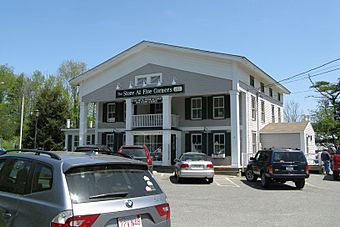Five Corners Historic District facts for kids
Quick facts for kids |
|
|
Five Corners Historic District
|
|

The Store at Five Corners
|
|
| Location | Williamstown, Massachusetts |
|---|---|
| Area | 58 acres (23 ha) |
| Architect | Unknown |
| Architectural style | Greek Revival, Other, Federal |
| NRHP reference No. | 92001717 |
| Added to NRHP | January 7, 1993 |
The Five Corners Historic District is a special area in South Williamstown, Massachusetts. It is called a historic district because it has many old and important buildings. This area is centered around a busy meeting point of several roads. These roads are Cold Spring, Green River, and New Ashford. This spot has been a key place in the area since 1760. Important buildings here include the South Center School and the Second Congregational Church. The district was added to the National Register of Historic Places in 1993. This means it is recognized as a place worth protecting.
Contents
What is the Five Corners Historic District?
The Five Corners Historic District covers about 58 acres (23 hectares) of land. It is located where Route 7, Massachusetts Route 43, and Sloan Road meet. Sloan Road is a local street west of the village. Because this area grew slowly and was a bit isolated, it has many different kinds of old buildings. Most of these buildings are homes.
What architectural styles can you see?
Many buildings show popular styles from the 1800s. You can see buildings in the Federal and Greek Revival styles. These are older American architectural styles.
Important buildings in the district
There are also some important non-residential buildings. The Second Congregational Church was built in 1875. It is a Gothic Revival style building. The Sloan Tavern was built around 1770. It was later updated to the Greek Revival style. The South Center School was built in 1868. These buildings help tell the story of the area's past.
How did Five Corners become a historic place?
Williamstown was first planned as a town in 1739. It officially became a town in 1765. The main part of town developed further north. The southern part of town, now called Five Corners, was planned later in 1765.
Early development of the village
Five Corners grew from the meeting point of four large land areas. It became an important stop in the late 1700s. This was because it was on the main north-south stagecoach route. Today, this route is United States Route 7. By the early 1800s, the village had a tavern, a store, and a cemetery. The first church was built in 1808.
Why did Five Corners stay agricultural?
The area remained mostly farms throughout the 1800s. This was because railroads were built elsewhere. Also, there was not much industrial activity here. This slow growth helped keep many of its old buildings safe.
 | Delilah Pierce |
 | Gordon Parks |
 | Augusta Savage |
 | Charles Ethan Porter |



